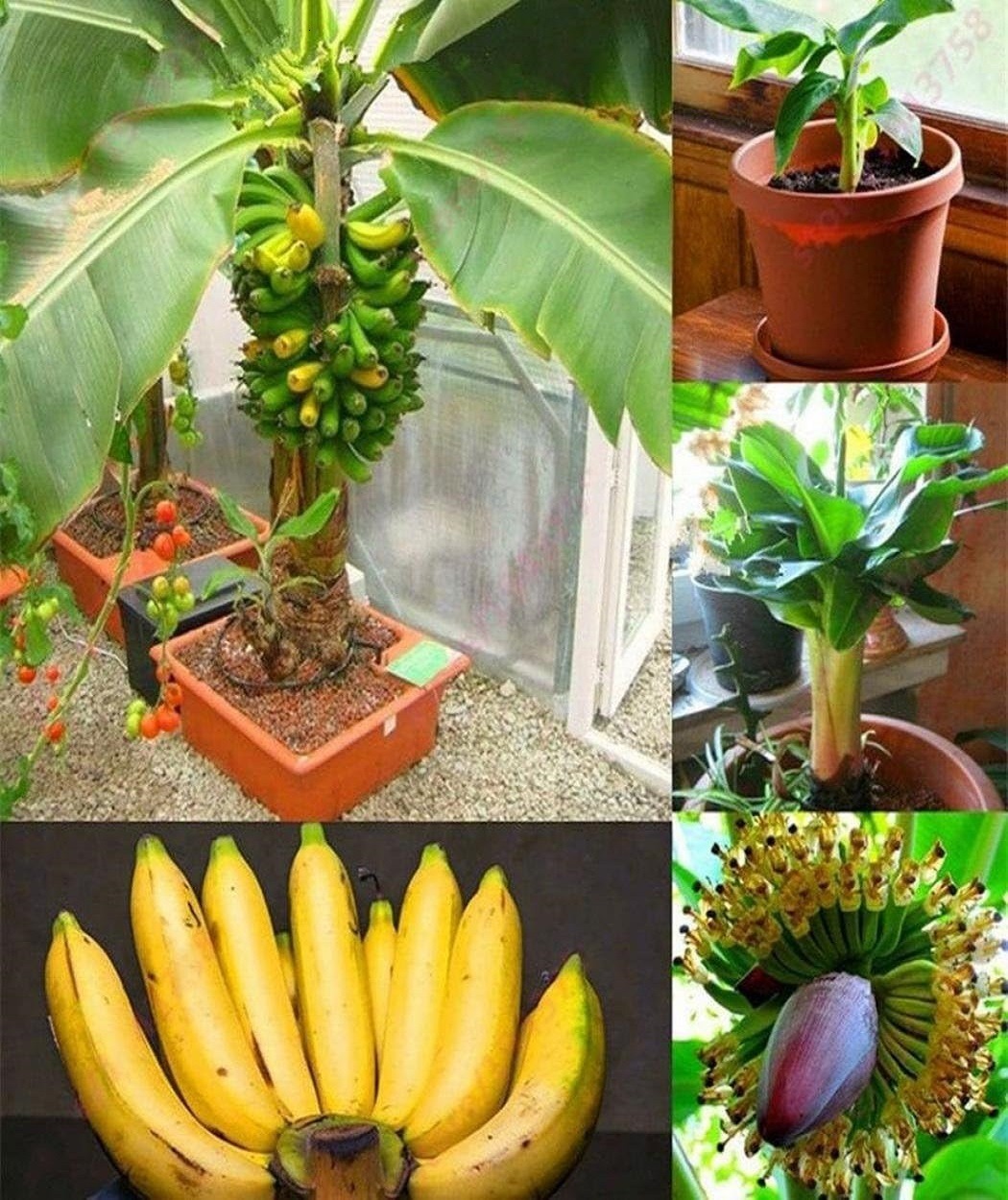Bananas, with their easygoing nature, are surprisingly straightforward to cultivate given the right mix of warmth and sunlight. And for those in cooler regions, don’t be disheartened – bananas make striking indoor greenery, bringing a lush, tropical vibe to any room.
Unexpected Facts About Banana Plants
Bananas grace fruit bowls worldwide, yet beneath their familiar peels lie some intriguing truths:
The banana is technically a berry, and the plant it grows on qualifies as a perennial herb, not a tree, due to its soft, central stem ensconced in spiraling leaves.
The underground heart of the banana plant, known as a corm, gives rise to the term “rhizome” for its root structure. When it comes to banana clusters, the words “hand” for a bunch and “finger” for an individual fruit come into play.

While Cavendish and Lady Finger are household names in the banana variety lineup, bananas generally favor the warm embrace of tropical climates, thriving best under the USDA zones 9 to 11 umbrella.
In a curious twist, select banana varieties have been tailored to endure cooler climates, braving regions as chill as zone 5, although such conditions may preclude fruit formation.
Equipped with this newfound knowledge, you can pick the perfect spot for your banana plant – cozy up indoors for a slice of tropical paradise or let it stretch out under the open sky.
Cultivating Bananas: A Guide for the Green-Hearted
Planting Tips
Bananas bask in warmth and sunlight but need protection from direct, intense rays. Aim for a partly shaded site that still enjoys generous daylight.
They flourish in soil that hits the sweet spot of slightly acidic to neutral pH, prioritizing efficient drainage and nutrient richness.
Considering their potential vertical reach, bananas warrant some shielding from blustery conditions. Opt for a protective strategy known as block planting, ensuring adequate space – around four feet apart – for each plant to foster fruitful growth and overall health.

Kick off by enriching the earth with compost. Then, carve out a sufficiently spacious pit for your plant and mound up the soil at its base to encourage drainage.
Nurturing Necessities
Keep the water coming, as bananas have quite the thirst. Sprinklers can do double duty by also boosting surrounding humidity levels. However, avoid waterlogging and promote good drainage to sidestep any rot issues. Surrounding your plant with mulch keeps the soil consistently moist.
Bananas also have a hearty appetite, requiring a steady diet of potassium-heavy fertilizers mingled with robust organic compost.

Pruning is not a pressing concern, except for removing lifeless or discolored foliage. The real task lies in managing the offshoots or pups that could drain the plant’s fruiting potential. Snip away the unwanted ones cleanly to channel the plant’s vigor into bearing fruit.
Pesky Problems

The usual suspects – aphids, mites, and snails – find banana plants irresistible. Tackle these critters with a simple spritz of soapy water beneath the leaves.
Banana weevils, the root and stem aficionados, are trickier. If they’ve made themselves at home in your banana stem, the only solution might be to remove the infested stem entirely.
Embracing the cultivation of banana plants, whether in the balmy outdoors or as a tropical indoor treasure, promises a journey filled with lush foliage and, potentially, the sweet reward of home-grown fruit.
Cultivating Bananas Within Your Sanctuary
Establishing Your Indoor Banana Garden
Bananas, with their towering presence and luscious foliage, can be a delightful addition to your indoor plant collection. For those with space considerations, the ‘Dwarf Cavendish’ banana is a perfect fit, reaching only half the size of its larger kin yet just as impressive.

When housing your banana plant indoors, select a pot that not only accommodates its expansive root system but also ensures efficient water drainage. Rich, potassium-laden soil with a slightly acidic to neutral pH is ideal for your indoor banana haven. Don’t skimp on organic fertilizers; they’re the secret sauce for a thriving banana plant.
Banana Plant Care Indoors
Hydration Essentials
The key to indoor banana plant care is a consistent watering schedule. Aim to keep the soil moist but not soggy, as excess water is a recipe for root rot. After a deep soak, allow any excess water to escape from the pot to prevent waterlogging.
Illumination and Climate Mastery
Banana plants have an insatiable appetite for sunlight. Aim for 8-12 hours of light daily, using a grow light if necessary. During the summer, let your plant bask in the outdoor sun, but remember, a humid atmosphere is crucial. Increase humidity with a room humidifier or by misting your plant with a water spray.
Pruning with Purpose
Indoor banana plants require meticulous pruning to avoid congestion in their pots. Trim away aged or damaged foliage and suckers to maintain an aesthetically pleasing and healthy plant.
Harvesting and Preservation
Patience pays off with banana plants, which typically take 6-9 months to fruit. As the plant matures, it will need support to handle the weight of the growing bananas. Harvest the fruits while still green, allowing them to ripen off the stem. The whole bunch should be snipped at once.
After the fruit harvest, the plant’s cycle concludes. In colder climes, protect the rhizome for a resurgence next spring, or alternatively, propagate a sucker for a fresh start.
Storing Your Tropical Bounty
Store harvested bananas in a cool, shaded space to prolong freshness. Refrigeration is an option, though avoid plastic wrapping. For an extended shelf life, freeze peeled and sliced bananas, ready for a refreshing smoothie or to thaw for later use.
Indoor banana cultivation may seem ambitious, but with the right love and care, these tropical beauties will not only grow but thrive, adding a burst of the tropics to your home or garden.

